新概念一lesson43-48课文及知识点教学文稿
- 格式:doc
- 大小:35.50 KB
- 文档页数:2
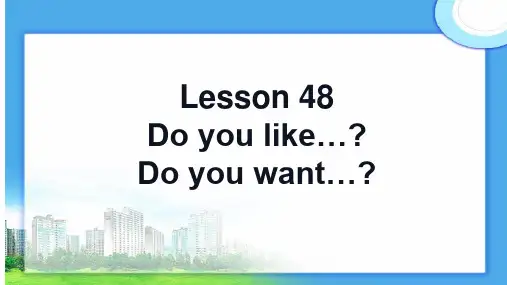
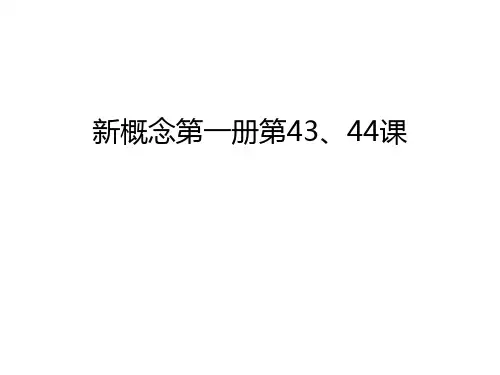
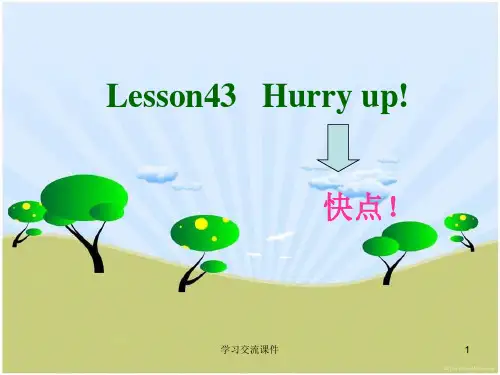
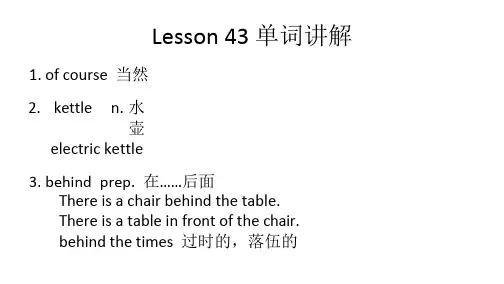
Lesson 43 单词讲解1.of course 当然2.kettle n. 水壶electric kettle3.behind prep. 在……后面There is a chair behind the table.There is a table in front of the chair.behind the times 过时的,落伍的Tom’s cell phone is behind the times.4.teapot n. 茶壶pot 锅,罐,容器hot pot 火锅flowerpot 花盆5.now adv. 现在,此刻--- What are you doing? --- I am cooking now. What are you going to do now?I am busy now.6.find v. 找到7.boil v. 沸腾,开The kettle is boiling.boil v. 煮Please boil me an egg. Please boil an egg for me. oil 油(汽油,食用油) oil painting 油画Lesson 43 课文讲解some & anysome adj. & pron. 一些,若干There is some beer in the bottle.Would you like some?any adj. & pron. 若干,任何Is there any beer in the bottle?No, there isn’t any.There are some books on the table. Are there any books on the table? There aren’t any books on the table. There is some water in the teapot. Is there any water in the teapot? There isn’t any water in the teapot. There are some boys in the room. Are there any boys in the room? There aren’t any boys in the room.如果是一个表示请求、建议、反问的疑问句,或希望得到对方肯定答案才提出的疑问句中可以用some.Shall I have some coffee?What about some tea?Why don’t we have some beer?Are there some students in the classroom?在一个表示部分否定的否定句中可以用some.Some of them are not Chinese.hurry v. 匆忙up adv. & prep. 向上,在高处get uphurry up (quickly)eat upspeed upspeak up (speak loudly) shut upwait up slow downcalm down come down here sit downput that downLesson 43 语法讲解情态动词canmustHe must go now.Must he go now? He needn’t go now. What must he do? We must study English.Must we study English? We needn’t study English. What must we do?She must be in the office.Must she be in the office? She mustn’t be in the office. Where must she be?I can help you.I can’t help you.Can I help you? Who can help you? She can swim.She can’t swim.Can she swim? Who can swim?I can see some clouds in the sky.I can’t see any clouds in the sky. Can you see any clouds in the sky? What can you see in the sky?Can you bring me some water, please? Can I have some water, please?Can I help you?Can I have your name?Can I have your phone number?Can I have your e-mail address?Can I use your bike?Can I have your order?Can I speak to Tom, please?Can I have a look at your cell phone?Can I have the key to the front door, please?Can1.能力Can you swim? I believe I can fly.Can you speak English?Do you speak English?2.允许(征求对方的意见)Can I come in? Can I smoke here?3.请求,要求Can you open the window, please? Can you shut up?Lesson 44 单词句型讲解some & any + 可数名词复数或不可数名词I can write some English letters (字母letter), but I can’t read any English _wo_r_d_s. (单词word)I can make some _tea (茶), but I can’t make any _c_offee. (咖啡)I can eat some _e_g gs_ (鸡蛋),but I can’t drink any bee_r. (啤酒)Lesson 43&44 知识拓展(学生版)1.(2008 北京) ---- you speak Japanese?---- No, I can’t.A. CanB. MustC. MayD. Should2.(2008 海南) ---- Ann, you say this word in Chinese?---- Yes, it’s easy.A. mayB. canC. mus。
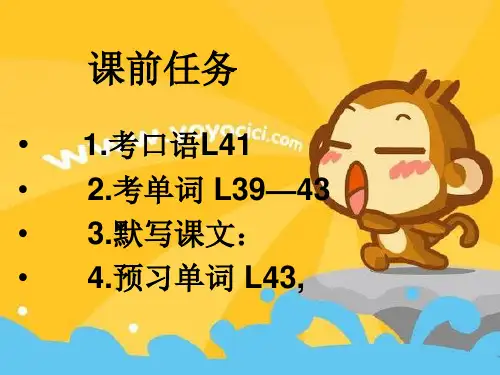
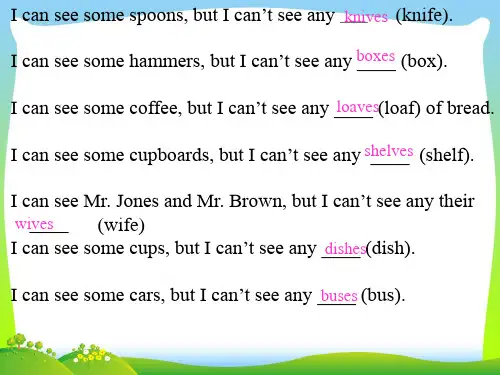
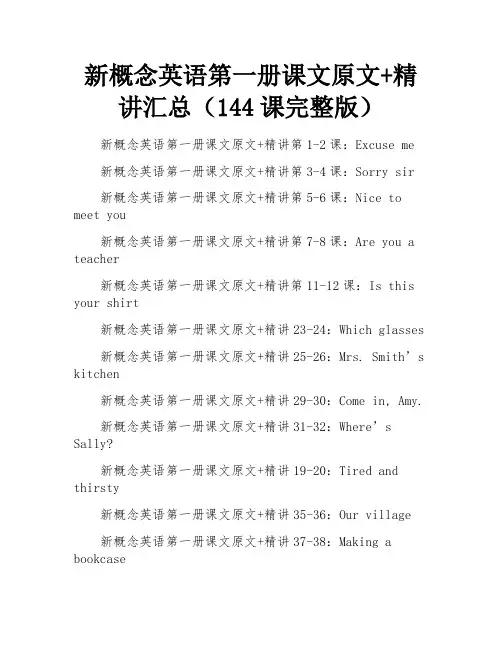
新概念英语第一册课文原文+精讲汇总(144课完整版)新概念英语第一册课文原文+精讲第1-2课:Excuse me新概念英语第一册课文原文+精讲第3-4课:Sorry sir新概念英语第一册课文原文+精讲第5-6课:Nice to meet you新概念英语第一册课文原文+精讲第7-8课:Are you a teacher新概念英语第一册课文原文+精讲第11-12课:Is this your shirt新概念英语第一册课文原文+精讲23-24:Which glasses新概念英语第一册课文原文+精讲25-26:Mrs. Smith’s kitchen新概念英语第一册课文原文+精讲29-30:Come in, Amy.新概念英语第一册课文原文+精讲31-32:Where’s Sally?新概念英语第一册课文原文+精讲19-20:Tired and thirsty新概念英语第一册课文原文+精讲35-36:Our village新概念英语第一册课文原文+精讲37-38:Making a bookcaseit!新概念英语第一册课文原文+精讲41-42:Penny’s bag新概念英语第一册课文原文+精讲33-34:A fine day新概念英语第一册课文原文+精讲43-44:Hurry up新概念英语第一册课文原文+精讲45-46:The boss’s letter新概念英语第一册课文原文+精讲47-48:A cup of coffee新概念英语第一册课文原文+精讲53-54:An interesting climate新概念英语第一册课文原文+精讲55-56:The Sawyer family新概念英语第一册课文原文+精讲57-58:An unusual day新概念英语第一册课文原文+精讲59-60:Is that all新概念英语第一册课文原文+精讲61-62:A bad cold新概念英语第一册课文原文+精讲63-64:Thank you , doctor新概念英语第一册课文原文+精讲67-68:The weekend新概念英语第一册课文原文+精讲69-70:The car race新概念英语第一册课文原文+精讲71-72:He’s awfulKing Street新概念英语第一册课文原文+精讲75-76:Unfortable shoes新概念英语第一册课文原文+精讲77-78:Terrible toothache新概念英语第一册课文原文+精讲81-82:Roast beef and potato新概念英语第一册课文原文+精讲83-84:Going on a holiday新概念英语第一册课文原文+精讲85课:Paris in the Spring新概念英语第一册课文原文+精讲87课:A car crash新概念英语第一册课文原文+精讲89课:For sale新概念英语第一册课文原文+精讲91课:Poor Ian新概念英语第一册课文原文+精讲93课:Our new neighbor新概念英语第一册课文原文+精讲95课:Ticket, please.新概念英语第一册课文原文+精讲97课:A small blue case新概念英语第一册课文原文+精讲99课:Ow!新概念英语第一册课文原文+精讲101课:A card from Jimmytest新概念英语第一册课文原文+精讲105课:Full of mistakes新概念英语第一册课文原文+精讲107课:It’s too small新概念英语第一册课文原文+精讲109课:A good idea新概念英语第一册课文原文+精讲111课:The most expensive model新概念英语第一册课文原文+精讲113课:small change新概念英语第一册课文原文+精讲115课:Knock,knock新概念英语第一册课文原文+精讲117课:Tommy’s breakfast新概念英语第一册课文原文+精讲119课: A true story新概念英语第一册课文原文+精讲121课: The man in the hat新概念英语第一册课文原文+精讲123课: A trip to Australia新概念英语第一册课文原文+精讲125课: Tea for two新概念英语第一册课文原文+精讲127课: A famous actress新概念英语第一册课文原文+精讲129课: 70 miles an hour新概念英语第一册课文原文+精讲133课: Sensational news新概念英语第一册课文原文+精讲135课:The latest新概念英语第一册课文原文+精讲139课:Is that you新概念英语第一册课文原文+精讲第141课:Sally’s first新概念英语第一册课文原文+精讲131课:Don’t be so sure。
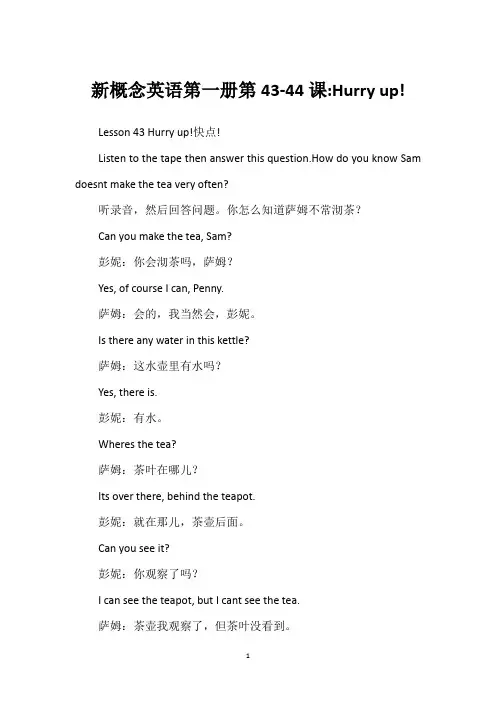
新概念英语第一册第43-44课:Hurry up!Lesson 43 Hurry up!快点!Listen to the tape then answer this question.How do you know Sam doesnt make the tea very often?听录音,然后回答问题。
你怎么知道萨姆不常沏茶?Can you make the tea, Sam?彭妮:你会沏茶吗,萨姆?Yes, of course I can, Penny.萨姆:会的,我当然会,彭妮。
Is there any water in this kettle?萨姆:这水壶里有水吗?Yes, there is.彭妮:有水。
Wheres the tea?萨姆:茶叶在哪儿?Its over there, behind the teapot.彭妮:就在那儿,茶壶后面。
Can you see it?彭妮:你观察了吗?I can see the teapot, but I cant see the tea.萨姆:茶壶我观察了,但茶叶没看到。
There it is!Its in front of you.彭妮:那不是么!就在你眼前。
Ah yes, I can see it now.萨姆:噢,是啊,我现在看到了。
Where are the cups?萨姆:茶杯在哪儿呢?There are some in the cupboard.彭妮:碗橱里有几只。
Can you find them?彭妮:你找得到吗?Yes. Here they are.萨姆:找得到。
就在这儿呢。
Hurry up, Sam.The kettles boiling.彭妮:快,萨姆。
水开了!New Word and expressions生词和短语of course当然kettlen. 水壶behindprep.在后面teapotn. 茶壶nowadv. 现在,此刻findv. 找到boilv. 沸腾,开Notes on the text课文解释1 make the tea 沏茶。

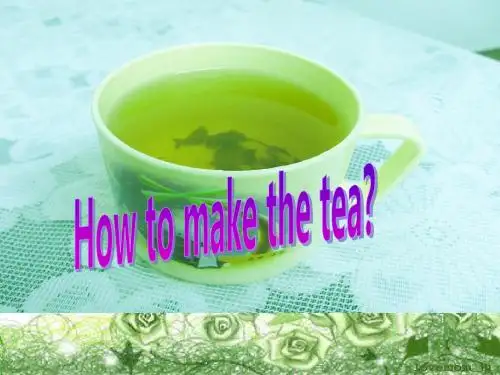
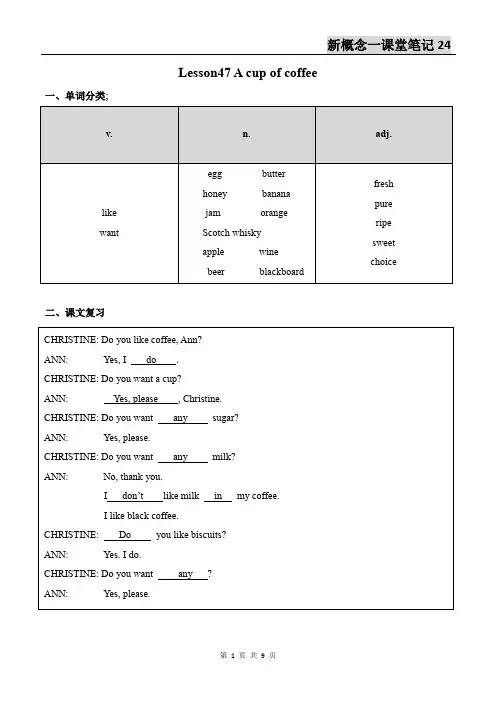
Lesson47 A cup of coffee 一、单词分类;二、课文复习三、课文重点四、词组五、语法解析1.like的用法①like+ 可数名词复数●I like apples(apple).●She likes dogs (dog).●We don’t like bananas (banana).●I like oranges. 我喜欢橙子。
●I like cats. 我喜欢猫。
②like+ 不可数名词●Do you like water (water)?●They like juice (juice) very much.●My father like wine (wine) very much.③like+ 动词ing ,意思是喜欢,强调爱好,习惯●What’s your hobby?I like drawing (draw).●The girl likes dancing (dance) very much. She goes to dance every day.●What do you like doing ?(do)④like+ to + 动词原形,意思是想要做某事,强调一次性的动作●I’m hungry. I like eating (eat) chicken.●It’s 7 o’clock. I like watching (watch) TV.练习:● 1. I like running .(run)● 2. I like to run this evening. (run)● 3. I like lemons . (lemon)● 4. I like playing (play) very much.● 5. I like to play (play) with my friends downstairs now.● 6. I like juice (juice).2.want的用法①want+ 可数名词单数/复数●I’m hungry. I want some hamburgers (hamburger).●Do you want an orange (orange)?●My father wants some eggs (egg).②want+ 不可数名词●Do you want any beer (beer)?●The man wants some wine (wine).●She wants some honey (honey)③want to do sth.●I want to play (play) computer games.●He wants you to help (help) me.●We want him to learn (learn) swimming.●The girl wants to dance (dance) in the park.练习:●I want a gift (gift).●I want to sleep (sleep).●I want you to help (help) me.●They want some chocolate (chocolate).●We want some bread (bread).●He wants a tree (tree).●She wants a dress (dress).3.助动词dodo的特征有:●本身无词义●辅助实意动词一起使用●构成否定句和疑问句He gives you a book. Does he give you a book? They sit there. Do they sit there?Jack turns on the lights. Does Jack turn on the lights?①do辅助构成否定句I like water.否定句:I don’t like water.We like running.否定句:I don’t like running.I want to sleep.否定句:I don’t want to sleep.They want to play outside.否定句:They don’t want to play outside.②do辅助构成疑问句I like water.一般疑问句:Do you like water?We like running.一般疑问句:Do you like running?I want to sleep.一般疑问句:Do you want to sleep?They want to play outside.一般疑问句:Do you want to play outside?句型转换:肯定句:I like jam.否定句:I don’t like jam.一般疑问句:Do you like jam?答句:Yes, I do. / No, I don’t. 肯定句:I want some honey.否定句:I don’t want any honey.一般疑问句:Do you want any honey? 答句:Yes, I do. / No, I don’t.适当形式填空:● 1. What can you do (do)?● 2. There is (be) some beer in the glass.● 3.I like swimming (swim) very much.● 4. Henry asks his mother to cook (cook) at once.● 5.Jeremy can’t answer (answer) your question.● 6. Don’t (not) come in.●7. Listen! The train is coming (come).●8. Do you like (like) taking a bus to school?●9. They don’t want (not want) these stories.●10. The teacher wants you to be (be) quiet.4.基数词:表示数量序数词:表示顺序基变序口诀:one first two second three third four fourthfive fifthsix sixthseven seventheight eighthnine ninthten tentheleven eleventhtwelve twelfth1.January is the first month of a year,2.National Day is the first day of October.3.December is the twelfth month of a year.4.Children’s Day is June first .5.This is my first (1) book.6.Yellow River is the s econd longest river in China,六、单词填空● 1. What's your favourite color? I like blue.● 2. My friend is ill. I'd like to buy a basket of e ggs for him.● 3. We need some b utter and milk to make bread.● 4. Don't eat those green bananas. They are not ripe .● 5. Scotch whisky is very famous wine.● 6. The teacher is standing in front of the b lackboard .●7. Buy some apples, please. They are very f resh and c hoice .七、语法练习1.用off, over, between, along, in front of, behind, under, 或across填空1. The aeroplane is flying over the village.2. The ship is going under the bridge.3. The children are swimming across the river.4. Two cats are running along the wall.5. The boy is jumping off the branch.6. The girl is sitting between her mother and her brother.7. The teacher is standing in front of the blackboard.8. The blackboard is behind the teacher.2.模仿例句提问并回答。
《新概念英语》第一册第43课Hurry up! 快点!【课文】PENNY: Can you make the tea, Sam? SAM: Yes, of course I can, Penny.SAM: Is there any water in this kettle? PENNY: Yes, there is.SAM: Where's the tea?PENNY: It's over there, behind the teapot. PENNY: Can you see it?SAM: I can see the teapot, but I can't see the tea. PENNY: There it is! It's in front of you!SAM: Ah yes, I can see it now.SAM: Where are the cups?PENNY: There are some in the cupboard. PENNY: Can you find them?SAM: Yes. Here they are.PENNY: Hurry up, Sam! The kettle's boil ing! 【课文翻译】彭妮:你会沏茶吗,萨姆?萨姆:会的,我当然会,彭妮。
萨姆:这水壶里有水吗?彭妮:有水。
萨姆:茶叶在哪儿?彭妮:就在那儿,茶壶后面。
彭妮:你看见了吗?萨姆:茶壶我看见了,但茶叶没看到。
彭妮:那不是么!就在你眼前。
萨姆:噢,是啊,我现在看到了。
萨姆:茶杯在哪儿呢?彭妮:碗橱里有几只。
彭妮:你找得到吗?萨姆:找得到。
就在这儿呢。
彭妮:快,萨姆。
水开了!Lesson 45The boss's letter 老板的信THE BOSS: Can you come here a minuteplease, Bob?BOB: Yes, sir?THE BOSS: Where's Pamela?BOB: She's next door.She's in her office, sir.THE BOSS: Can she type this letter for me?Ask her please. BOB: Yes, sir.BOB: Can you type this letter for the boss please, Pamela?PAMELA: Yes, of course I can.BOB: Here you are.PAMELA: Thank you, Bob.PAMELA: Bob!BOB: Yes? What's the matter.PAMELA: I can't type this letter.PAMELA: I can't read it!The boss's handwriting is terrible!参考译文老板:请你来一下好吗?鲍勃?鲍勃: 什么事,先生?老板:帕梅拉在哪儿?鲍勃: 她在隔壁,在她的办公室里,先生。
老板:她能为我打一下这封信吗?请问她。
鲍勃: 好的,先生。
鲍勃: 请你把这封信给老板打一下可以吗,帕梅拉?帕梅拉:可以,当然可以。
鲍勃: 给你这信。
帕梅拉:谢谢你,鲍勃。
帕梅拉:鲍勃!鲍勃: 怎么了?怎么回事?帕梅拉:我打不了这封信。
帕梅拉:我看不懂这封信,老板的书写太糟糕了!lesson 47MRS YOUNG: Do you like coffee, Mrs Price?MRS PRICE: Yes, I do.MRS YOUNG: Do you want a cup?MRS PRICE: Yes, please. Mrs Young.MRS YOUNG: Do you want any sugar?MRS PRICE: Yes, please.MRS YOUNG: Do you want any milk?MRS PRICE: No, thank you. I don't like milk in mycoffee.I like black coffee.MRS YOUNG: Do you like biscuits?MRS PRICE: Yes, I do.MRS YOUNG: Do you want one?MRS PRICE: Yes, please.参考译文克里斯廷:你喜欢咖啡吗,安?安:是的,我喜欢。
克里斯廷:你想要一杯吗?安:好的,请来一杯,克里斯廷。
克里斯廷:你要放些糖吗?安:好的,请放一些。
克里斯廷:要放些牛奶吗?安:不了,谢谢。
我不喜欢咖啡中放牛奶,我喜欢咖啡。
克里斯廷:你喜欢饼干吗?安:是的,我喜欢。
克里斯廷:你想要一块吗?安:好的,请来一块。
Lesson43--48课1 of course[əv'kɔ:s] 当然2 kettle['ketl] n.水壶3 behind[bi'haind] prep.在…后面4 teapot['ti:pɔt] n.茶壶 5 now[nau] ad.现在,此刻6 find[faind] v.找到7 boil[bɔil] v.沸腾,开8 can[kæn] 能够9boss[bɔs]n.老板,上司10minute['minit, mai'nju:t] n.分(钟)11 ask[ɑ:sk] v.请求,要求12 handwriting['hændˌraitiŋ]n.书写13 terrible['terəbəl] a.糟糕的,可怕的14 lift[lift] v.拿起,搬起,举起15 cake[keik] n.饼,蛋糕16 biscuit['biskit] n.饼干17 like[laik] v.喜欢,想要18 want[wɔnt, wɑ:nt] v.想19 fresh[freʃ] a.新鲜的20 egg[eg] n.鸡蛋21 butter['bʌtə] n.黄油22 pure[pjuə] a.纯净的23 honey['hʌni] n.蜂蜜24 ripe[raip] a.成熟的25banana[bə'nɑ:nə] n.香蕉26 jam[dʒæm] n.果酱27 sweet[swi:t] a.甜的28 orange['ɔrindʒ] n.橙29 Scotch whisky苏格兰威士忌30 choice[tʃɔis] a.上等的,精选的31 apple['æpəl] n.苹果32wine[wain] n.酒,果酒33 beer[biə] n.啤酒34 blackboard['blækbɔ:d]n.黑板II词组1make the tea 的意思是沏茶,2 hurry up! 快一点!3over there 在那儿4next door 隔壁5 in this kettle 在水壶里6 in the cupboard 在橱柜里6can 能,会can后加动词原形,变否定在can后加not,变疑问将can提前。
7. find 找到,强调找的结果; look for 寻找,强调找的动作。
8.behind 在....后边---反义词in front of 在。
前面9.now= at the moment 此刻,现在10 ask:1) 问ask a question 问一个问题2)让,要求ask Sb to do Sth 让某人做某事11 lift:1)举起,搬起,拿起lift that chair 举起那把椅子2)电梯3)give Sb a lift搭便车12:come here a minute 过来一会13 in her office 在她的办公室14type this letter for Sb 为某人打这封信15.like 喜欢like to do Sth (偶尔)喜欢做某事I like to play football this Sunday.like doing Sth(长期)喜欢做某事I like playing football on Sundays16.want 想①want to do Sth 想要做某事②I don’t want to do Sth。
我不想做某事③want Sth 想要某物你想要一些糖吗?Do you want any sugar? =Would you like some sugar?17 a cup of coffee一杯咖啡milk in my coffee 在咖啡里加牛奶white/black coffee 清/加奶III重点句型:1Can you make the tea? 你会沏茶吗?Yes,of course I can.=Yes,I certainly can.=Sure. 是的,我当然会。
2 Is there any water in this kettle? Yes, there is. 水壶里有水吗?是的,有。
3Can you see it? I can see the teapot, but I can’t see the tea. 你能看见它吗?我能看见茶壶,但是我没看到茶叶。
4Can you find them? 你能找到他们吗?5 Can you come here a minute please? 你能过来一下吗?6Can she type this letter for me? 她能为我打这封信吗?7 I can’t read it. 我看不懂这封信。
8 I can’t type this letter. 我不能打这封信。
9Can you type this letter for the boss? 你能为老板打这封信吗?10What’s the matter (with…)?=What’swrong(with…)?=What’s up(with…)? (……)怎么了?11一般疑问句:Do you like any+ 可数名词复数/不可数名词? 你喜欢一些.......吗?肯定回答:Yes, I do. 是的,我喜欢。
/否定回答:No, I don’t.不,我不喜欢。
肯定句:I like some+ 可数名词复数/不可数名词. 我喜欢一些。
否定句:I don’t like any+可数名词复数/不可数名词。
我不喜欢一些。
like为实义动词(有“喜欢”的意思;有动作为实义动词),变否定句和疑问句借助助动12Do you like coffee? 你喜欢咖啡吗?Yes, I do. /No, Idon’t.13Do you want a cup (of coffee)? 你想要一杯咖啡吗?Yes,please. (是的,请给我一杯);No, thank you.14Do you want any sugar? 你想要一些糖吗? I likeblack coffee. 我想要清咖啡.15I don’t like milk in my coffee.我不喜欢咖啡中放牛奶.语法:动词分类,一般现在时1.动词分类:be动词,情态动词(can, must , need),助动词(do/does),实义动词情态动词特征:后加动词原形,不能单独做谓语,需要与其他动词一起共同构成谓语.do: 助动词,帮助实义动词的词,无词义,用在否定句和疑问句中,后加动词原形。